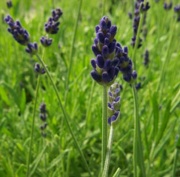Difference between revisions of "Spike oil"
Jump to navigation
Jump to search
(username removed) |
|||
| (3 intermediate revisions by 2 users not shown) | |||
| Line 2: | Line 2: | ||
== Description == | == Description == | ||
| − | Oil extracted from the leaves of lavender plants (''Lavandula latifolia'' or ''Lavandula spica'') from the mint family. Spike lavender oil is a [ | + | Oil extracted from the leaves of lavender plants (''Lavandula latifolia'' or ''Lavandula spica'') from the mint family. Spike lavender oil is a [[nondrying%20oil|nondrying oil]] that was first used as a [[retardant|retardant]] and [[thinner|thinner]] in [[oil%20paint|oil paints]] in the 16th century (Mayer 1969). Although similar to [[turpentine%20%28oil%29|turpentine]], spike oil evaporates slower and can become gummy. It is a powerful [[solvent|solvent]] that can make oil paints and [[varnish|varnishes]] sticky. |
== Synonyms and Related Terms == | == Synonyms and Related Terms == | ||
| Line 8: | Line 8: | ||
''Lavandula latifolia; Lavandula spica''; spike lavender oil; esencia de espliego (Esp.); olio di lavanda (It); oil of spike | ''Lavandula latifolia; Lavandula spica''; spike lavender oil; esencia de espliego (Esp.); olio di lavanda (It); oil of spike | ||
| − | == | + | == Physical and Chemical Properties == |
| − | + | * Yellowish to greenish color with strong odor. | |
| + | * Boiling Point = 170-200 C | ||
| − | + | ==Resources and Citations== | |
| − | |||
| − | |||
| − | |||
| − | |||
| − | + | * R. J. Gettens, G.L. Stout, ''Painting Materials, A Short Encyclopaedia'', Dover Publications, New York, 1966 | |
| − | + | * Ralph Mayer, ''A Dictionary of Art Terms and Techniques'', Harper and Row Publishers, New York, 1969 (also 1945 printing) | |
| − | + | * John S. Mills, Raymond White, ''The Organic Chemistry of Museum Objects'', Butterworth Heineman, London, 2nd ed., 1994 | |
| − | * | + | * M. Doerner, ''The Materials of the Artist'', Harcourt, Brace & Co., 1934 |
| − | * | + | * G.S.Brady, ''Materials Handbook'', McGraw-Hill Book Co., New York, 1971 Comment: p. 589 |
| − | * | + | * Random House, ''Webster's Encyclopedic Unabridged Dictionary of the English Language'', Grammercy Book, New York, 1997 |
| − | |||
| − | |||
| − | |||
| − | |||
| − | |||
| − | |||
* ''The American Heritage Dictionary'' or ''Encarta'', via Microsoft Bookshelf 98, Microsoft Corp., 1998 | * ''The American Heritage Dictionary'' or ''Encarta'', via Microsoft Bookshelf 98, Microsoft Corp., 1998 | ||
Latest revision as of 17:11, 2 June 2022
Description
Oil extracted from the leaves of lavender plants (Lavandula latifolia or Lavandula spica) from the mint family. Spike lavender oil is a Nondrying oil that was first used as a Retardant and Thinner in oil paints in the 16th century (Mayer 1969). Although similar to turpentine, spike oil evaporates slower and can become gummy. It is a powerful Solvent that can make oil paints and varnishes sticky.
Synonyms and Related Terms
Lavandula latifolia; Lavandula spica; spike lavender oil; esencia de espliego (Esp.); olio di lavanda (It); oil of spike
Physical and Chemical Properties
- Yellowish to greenish color with strong odor.
- Boiling Point = 170-200 C
Resources and Citations
- R. J. Gettens, G.L. Stout, Painting Materials, A Short Encyclopaedia, Dover Publications, New York, 1966
- Ralph Mayer, A Dictionary of Art Terms and Techniques, Harper and Row Publishers, New York, 1969 (also 1945 printing)
- John S. Mills, Raymond White, The Organic Chemistry of Museum Objects, Butterworth Heineman, London, 2nd ed., 1994
- M. Doerner, The Materials of the Artist, Harcourt, Brace & Co., 1934
- G.S.Brady, Materials Handbook, McGraw-Hill Book Co., New York, 1971 Comment: p. 589
- Random House, Webster's Encyclopedic Unabridged Dictionary of the English Language, Grammercy Book, New York, 1997
- The American Heritage Dictionary or Encarta, via Microsoft Bookshelf 98, Microsoft Corp., 1998
- Art and Architecture Thesaurus Online, http://www.getty.edu/research/tools/vocabulary/aat/, J. Paul Getty Trust, Los Angeles, 2000
